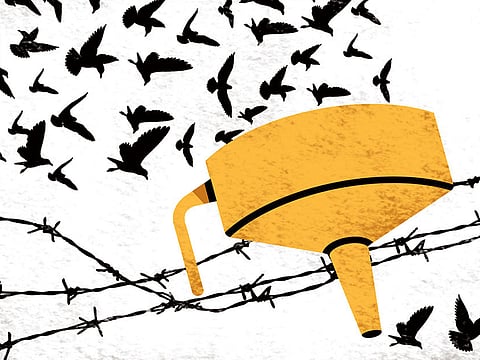Solving refugee crisis begins with perspective
The voices least heard in the debate are migrants themselves and if media and politicians continue to perceive them as ‘cockroaches’ or ‘statistics’, the crisis will only escalate

People move. The history of humanity is a history of migration. Since the earliest movement of Homo erectus out of Africa across Eurasia, humankind has had reason and the means to travel from one place to another. Sometimes that movement is orderly, planned and peaceful. But just as often it is harried and desperate, a violent expulsion of large numbers of people fleeing persecution, war, famine or other natural disasters.
Throughout history, communities, polities and civilisations have been destroyed, supplanted or enriched by inflows of people from foreign cultures and ethnic groups. People have always moved, but today more people are being unwillingly displaced from their homes than at any time since the end of the second world war.
That displacement is sustained: More than three million Syrians remain forced from their homeland by four years of conflict; 130,000 Myanmarese ethnic minorities perennially huddle in camps on the Thai border; and more than a million Afghans live, with varying levels of official sanction, in Pakistan. Some have been there more than 30 years, waiting for a chance to go home.
But the two near concurrent crises in the Mediterranean and Andaman seas have brought the issue of boat-borne asylum seekers from the abstract — a discussion of numbers, of people-smuggling “rackets”, and of push-and-pull factors — into the personal.
Pictures of stricken boats jammed with desperate Rohingya asylum seekers pleading to be allowed to land anywhere, or the sight of an Eritrean woman being rescued by a Greek army sergeant from the waves off Rhodes has transformed asylum seekers from an anonymous, undifferentiated mass into people. And this concurrence emphasises the fact that the issue of irregular migration is not a European problem or a south-east Asian one. It does not belong to poor countries, or to rich. It is a global issue.
For the media, the issue of irregular migration is an inherently difficult one on which to report. The people making these journeys are often coming from war zones, or situations of persecution. Some might be seeking to hide their true motives for moving, for good or other reasons. Others are stranded on boats in the ocean, almost inaccessible, or they are incarcerated, or living clandestine existences in the places where they have arrived.
As a result, the voices least heard in the debate around migration are often the migrants themselves. They are defined, instead, by the language used by others to describe them, and their image — the broader understanding of who they are — is created not by themselves, but by others. The media has a responsibility in how it reports on some of the most vulnerable people in the world, a responsibility not always upheld. There are outliers in the discourse, but asylum seekers are condemned by some as “vermin” and “like cockroaches”, or sneered at as “filthy”, “grubby” or “penniless”.
But the rhetorical manipulation exists more subtly too. On the debate around asylum seekers, governments hold disproportionate influence because they often hold all the information: How many people have arrived and how; what action has been taken on the high seas.
Politicians globally use this control of information to build broader narratives around “illegals”, “queue jumpers” or “suspected terrorists” — constructions that are often uncritically accepted, reproduced and disseminated by reporters. The false dichotomy of the “good” refugee — who waits patiently in a camp for the resettlement that may never come — and the “bad” refugee, who takes her chances on a boat, amplifies fear of the unknowable interloper.
At its heart, the inherent tension in the asylum-seeker debate is a conflict of competing rights and of concern over control. Nations have a sovereign right and governments a responsibility towards their citizens, to control their borders. But people facing persecution have a legal right to seek asylum and the nature of their arrival is mandated in law not to be prejudicial to their claim or treatment.
Politicians use control of information to build broader narratives around ‘illegals’ or ‘suspected terrorists’.
Migration, when it is controlled and orderly, is far less challenging to politicians and their publics. When it is disordered and chaotic — when it is perceived to be “out of control” — it carries with it a fear of the unknown. It should not take a tragedy like the deaths of hundreds drowned in the Mediterranean Sea or a standoff involving boatloads of starving asylum seekers looking for any port that will let them land to inspire the world to find a long-term solution that may reduce the chances of these things happening again, to find safer, more ordered ways of enabling people to move. But if nothing changes, nothing will change and these calamities will be with us once more.
— Guardian News & Media Ltd



